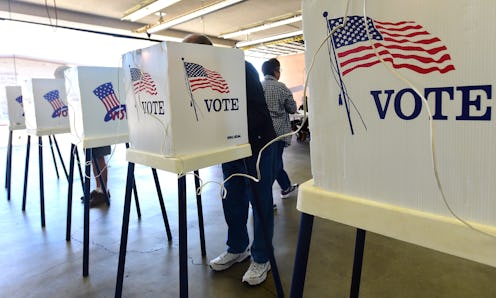News
California's Many Delegates May Wrap Up The Race
After a slow month of presidential primaries, we have reached the last super Tuesday and the big kahuna of states, California. The most populous in the country, the Golden State is a delegate gold mine in both parties. With Trump having sewn up his party's — err, the GOP's — nomination, the race between Hillary Clinton and Bernie Sanders has taken center stage. A big win in this state could have huge consequences for the races, sheerly because the delegates that are so many delegates up for grabs. So how many delegates does California have?
Like always, it depends on which party we're talking about. Since Trump has already reached the number needed to win the Republican nomination, consider the GOP first. There are a total of 172 delegates up for grabs. They will all be bound and are mostly allocated by congressional district. Each gets three delegates that go to the top vote winner. Since Trump is the only candidate left in the race, he could potentially sweep the 159 delegates assigned this way. Another 13 are given to the statewide winner — three of these delegates are party leaders, but they are bound to vote for the winner.
The Democrats award a whopping 475 pledged delegates based on the results of the California primary. That dwarfs the second-closest state, New York, which had just 247. The Democrats use population and the state's past support of Democrats to decide how many delegates each state gets. Clinton's lead has hovered around 270 delegates, far fewer than can be won in just this state.
Even if Sanders were to win California, though, it likely wouldn't make a difference. As in all the Democratic primaries, the delegates are awarded proportionally. They are also split into congressional districts, with some getting more delegates and some getting less, based on whether they are heavily Republican or Democrat areas of the state. A total of 317 delegates are assigned this way. Then another 158 are allocated based on the statewide results — but again in a proportional manner. He currently leads in the state by about 2 percentage points.
Then there are of course the state's superdelegates. They number 73 and only 16 are still up for grabs. Clinton has secured support from 57. They include party bigwigs like Sen. Dianne Feinstein, Sen. Barbara Boxer, and Gov. Jerry Brown. Noticeably absent is House Minority Leader Nancy Pelosi. She has declined endorsing Clinton, claiming the timing isn't right and that superdelegates have too much power.
Clinton is hoping to win enough of California's pledged delegates — ideally a majority, even a slight one — to push her over the edge and clinch her the nomination before the convention. That would help her consolidate support within the party as early as possible. Sanders, though, has promised that he will press on to the convention in July — even if Clinton wins both California and New Jersey. That has angered Democrats, particularly in the Senate.
Despite Sanders' plans to press on, and barring any huge surprises, the primary race should be over on Tuesday. Then it's all eyes toward November.
